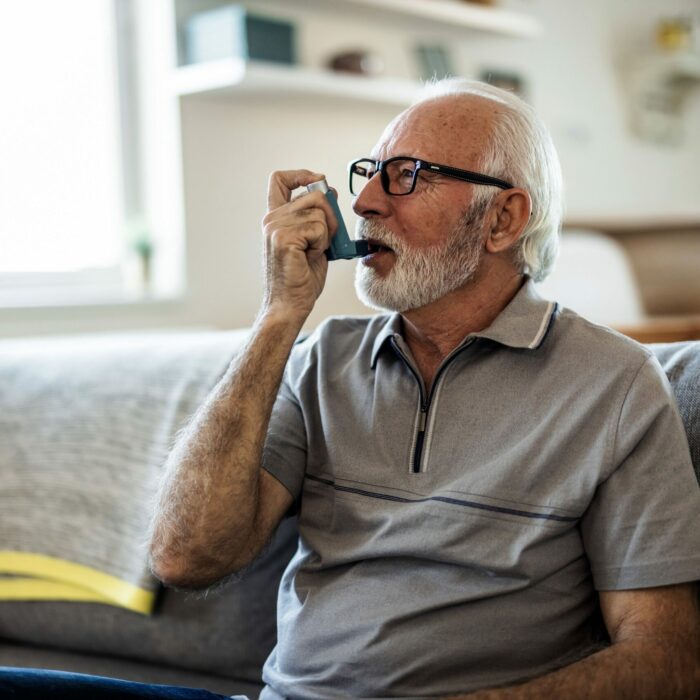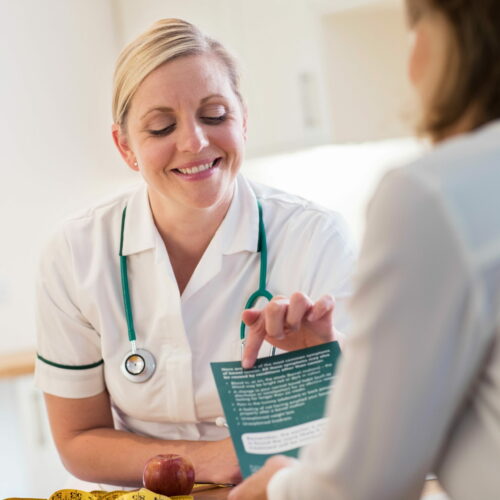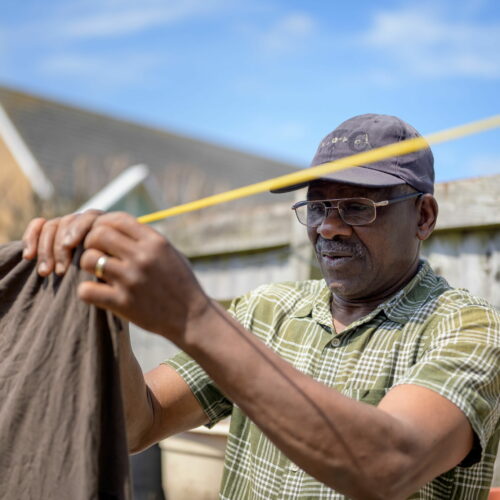When to see the doctor.
On this page we will discuss the following topics:

I’ve been discharged from hospital, what now?
Once you have been discharged, you can go home and continue your treatment from there. Your medical team will make sure that you are cared for during this process and that you have all the tools that you need to manage your condition.
The first thing your medical team will do is discuss a ‘care bundle’ with you. This helps decide what kinds of support and services you might need after your stay in hospital. As part of this care bundle, you should receive a phone call within 72 hours to see how you are getting on.1
If you consented to this call and don’t receive one, please be sure to let your medical team know.
Care bundles can include the following items:1
- A review of your medication and a check of inhaler technique
- A self-management plan
- A Rescue Pack of medicines
- Help to stop smoking (if needed)
- An assessment to see if you’d benefit from pulmonary rehabilitation (PR)

Can I speak to someone after I have been discharged?
You should have a review appointment in the first 4 weeks after discharge.2
During this review, your medical team will check your symptoms and make sure that you have the correct medication. They will also check that you have been shown the best way to use your inhaler or inhalers.2
Want to discuss this topic in your next appointment?
Add this to your discussion list as a handy reminder to discuss this with your doctor, nurse or pharmacist at your next appointment.
What happens if I need to use my Rescue Pack?
If you do experience a flare-up and you need to use your Rescue Pack, make sure you let your medical team know that you used some of the medicines from this.4
You should also let your medical team know if things didn’t improve within two days of starting the Rescue Pack.4
People with COPD using 3 or more Rescue Packs in a year should be offered a review of their condition to check everything has been done to reduce the risk of flare-ups.4
You can always call your medical team for more advice. Use your helpful discussion list to plan your call and note down any questions.
I'm unsure when and how much medication to take
Treating COPD can sometimes mean being prescribed a mix of inhalers and medicines. It’s not surprising that even when you’ve been told what to take, how often and when, it’s easy to forget.
Asthma + Lung UK have produced a helpful booklet, available here. You can use this to help you to understand what medicines you are taking and when to take them.5
You can also take this to your next appointment with your medical team and fill it out with them.
What if I have other questions?
If you are ever unsure about anything to do with your COPD or your treatments, please talk to any one of your medical team. You might find it helpful to write down your questions or any concerns you have before you speak to them. You can use your helpful discussion list to prepare for your appointment.
I’m unsure about how well my medication is working
You might feel that your medication is not working as well as it previously did.
This might be because you have had multiple flare-ups where you’ve had to use your Rescue Pack, or you have noticed that your symptoms have been getting worse over time.
If this is the case, the first step is to check that you are using your inhaler or inhalers correctly. You can check this by asking your medical team to review your technique.3
What if I am still not sure if my medication is working well?
If you are still not sure that your medication is working as well as it used to, then book a review with your medical team.
You can use your helpful discussion list to help guide the conversation.
I’m unsure about my inhaler technique
What are the different types of inhalers?
If you’re given an inhaler, it’s really important you take it as prescribed, even if you feel well. This can also reduce the risk of a flare-up.3
Inhaled medicine can be taken in different ways:3
- Dry powder inhalers: these are designed to breathe in as hard as you can, then hold your breath for ten seconds
- Soft mist inhalers: these produce a spray of medicine
- Pressurised metered dose inhalers: they produce a puff of medication like a spray and are taken in using a slow deep breath in, which you hold for up to 10 seconds
- Spacers: these attach to pressurised metered dose inhalers to help you breathe in the medicine more effectively
- Nebulisers: these turn the medicine into a spray that you can breathe in. They are normally only used in an emergency when you need large doses of inhaled medicine, such as during a flare-up

How can I check that I am using my inhaler or inhalers correctly?
Your inhaler will only help if you use it correctly, so it is important to get your technique right. If you are not sure, you can ask your medical team to show you how to use it. You should review this at least once a year with your doctor, nurse or pharmacist.3
What if I am still struggling with my inhaler technique?
If you feel that you are still struggling with symptoms or your inhaler technique, book an appointment with one of your medical team.
You can use your discussion list to help you to plan for your appointment.
What if I need further advice on living with COPD?
If you would like further advice, you can book a review with your medical team.
Use the COPD Assessment Test (CAT) in your helpful discussion list, to help guide the conversation.
I would like to cut down or stop smoking
It can be really difficult to give up smoking without help and support. If you can stop, this will make living with your COPD easier. You’ll feel less short of breath and cough less.8
Giving up smoking means not only managing the addiction to nicotine, but also making changes to your daily habits too.8
You can take tablets or use nicotine replacement therapy, such as lozenges, patches or gum. Your doctor, nurse or pharmacist can advise you on what might be best for you.9,10
There are lots of ways you can cut down or stop smoking, and there is plenty of support available. By finding the right kind of support and medication, you’re about 3 times more likely to cut down or stop for good compared to stopping without support or medication.10
What if I need help to stop smoking?
If you would like help to stop smoking, you can book a review with your doctor, nurse or pharmacist.
You can use your helpful discussion list to help guide the conversation.
Want to discuss this topic in your next appointment?
References
- British Thoracic Society. COPD Discharge Care Bundle. Available at: https://www.brit-thoracic.org.uk/document-library/quality-improvement/copd/copd-discharge-care-bundle/
- NHS. Exacerbation of COPD and what to expect after discharge. Available at: https://www.gloshospitals.nhs.uk/documents/12178/Exacerbation_of_COPD_and_what_to_expect_after_discharge_GHPI1644_02_21.pdf
- Asthma + Lung UK. Medications for COPD. Available at: https://www.asthmaandlung.org.uk/conditions/copd-chronic-obstructive-pulmonary-disease/medications-copd
- Asthma + Lung UK. Managing COPD flare-ups. Available at: https://www.asthmaandlung.org.uk/conditions/copd-chronic-obstructive-pulmonary-disease/managing-copd-flare-ups
- Asthma + Lung UK. COPD Management Plan Available at: https://shop.asthmaandlung.org.uk/collections/health-advice-resources/products/copd-self-management-plan
- WebMD. Talking to your family and friends about COPD. Available at: https://www.webmd.com/lung/copd/copd-family-friends
- NHS. Living with COPD. Available at: https://www.nhs.uk/conditions/chronic-obstructive-pulmonary-disease-copd/living-with/
- Asthma + Lung UK. Why is smoking bad for me? Available at: https://www.asthmaandlung.org.uk/living-with/stop-smoking/why-is-it-bad
- NHS. Stop smoking treatments. Available at: https://www.nhs.uk/conditions/stop-smoking-treatments/
- Asthma + Lung UK. What are the treatments for COPD? Available at: https://www.asthmaandlung.org.uk/conditions/copd-chronic-obstructive-pulmonary-disease/what-are-treatments-copd

